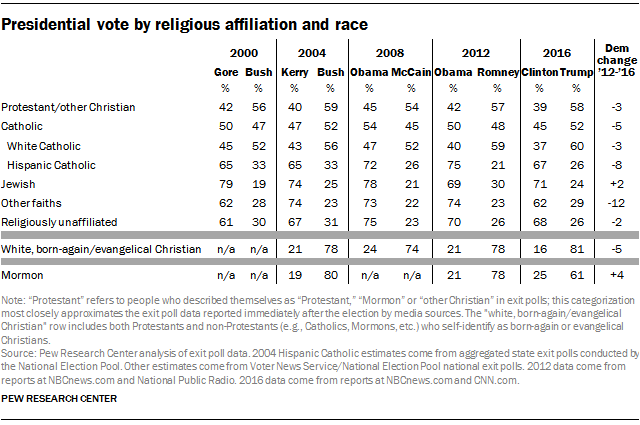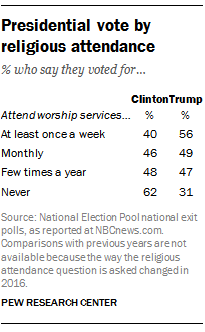Squish Like Grape
You are here
U.S. Politics and the "Religion Problem"
Primary tabs
Former Obama White House staffer Michael Wear has caused a stir while promoting his recent book Reclaiming Hope. In an interview with Emma Green for the Atlantic, Wear commented on the fact that 81 percent of white evangelicals voted for Donald Trump. Wear lamented that the Democrats, in his view, did not make much of an effort to reach out to people of faith.
[T]here’s a religious illiteracy problem in the Democratic Party. It’s tied to the demographics of the country: More 20- and 30-year-olds are taking positions of power in the Democratic Party. They grew up in parts of the country where navigating religion was not important socially and not important to their political careers.
Dan Schultz, writing for Religion Dispatches, points out that Wear's claims are not new, and not accurate.
Early in 2005, one commentator came out with a rather hare-brained lamentation. If only John Kerry had shown more love to social conservatives, the writer said, he would be president… It was the beginning of a mantra I’ve heard many times since.
I did the math. This was actually a dubious proposition with little or no evidence to support it. Other, higher-profile writers agreed with my assessment. Well, that’s that, I thought. We won’t hear this nonsense again.
But we did. Again and again.
For eleven stupid years, I have been pointing out time and again the same response. The modern GOP has been able to leverage social resentment to activate authoritarian voters. Under George W. Bush, they did it with fears of global Islamic terror. With Donald Trump, they added attacks on Hispanic immigrants and feminism.
In fact, a quick analysis of voting trends in America reveals a plain truth. Religion and the social issues it stands in for are about the last things anybody votes on. People vote their race, then their pocketbook, then their need for national security.
Fred Clark points out that this tactic is much older than that, connecting it all the way back to the theological defense of slavery in pre-civil war times.
That’s the same thing that was said 180 years ago about the abolitionists. Just look — the American Anti-Slavery Society was at war with the American Bible Society. Clearly, then, the abolitionists had a religion problem.
According to Schultz and Clark, the problem isn't that Democrats have a problem reaching out to Evangelicals, the problem is that Evangelicals don't vote based on their faith. Faith language from Democrats simply does not appeal to white Evangelical voters. Wear even acknowledges this in the Atlantic interview.
The president went to Notre Dame in May of 2009 and gave a speech about reducing the number of women seeking abortions. It was literally met by protests from the pro-life community.
The numbers show just how anomalous white Evangelicals are. According to polling from the Pew Research Center, the only religious groups to give Trump a majority of the support were white Evangelicals, white Catholics, and Mormons.
If you exclude white Evangelicals from the All Protestant group, the remaining Protestants gave a slight edge to Hillary Clinton. The same is true of Catholics. But even between white Catholics and white Evangelicals there is a big difference, with Hillary Clinton receiving less than half the support among white Evangelicals that she did among white Catholics.
It's been pointed out over the years that regular church attendance correlates with voting Republican. And the numbers show this was a major factor in November's election as well. But the Pew Center's polling shows it wasn't a big enough factor to explain the Evangelical anomaly.
Among all believers, those who attend worship at least once a week supported Trump by a ratio of nearly 3 to 2. This does not come close to explaining the 5 to 1 split among white Evangelicals, although it is very close to the numbers for all Protestants.
The problem isn't that Democrats have trouble speaking to people of faith. The problem is that white Evangelicals don't follow the typical voting patterns of people of faith.
No amount of political outreach will change that.
Theme by Danetsoft and Danang Probo Sayekti inspired by Maksimer




